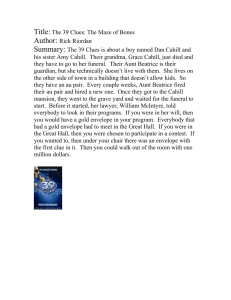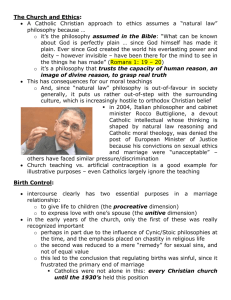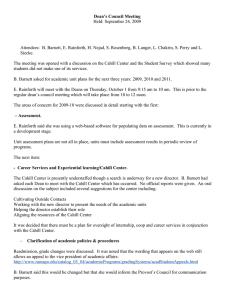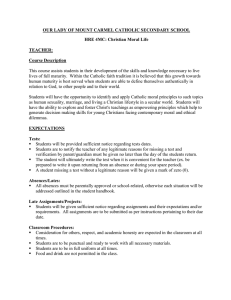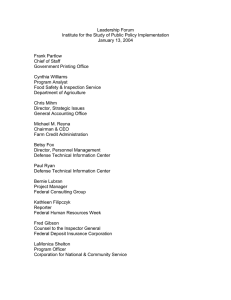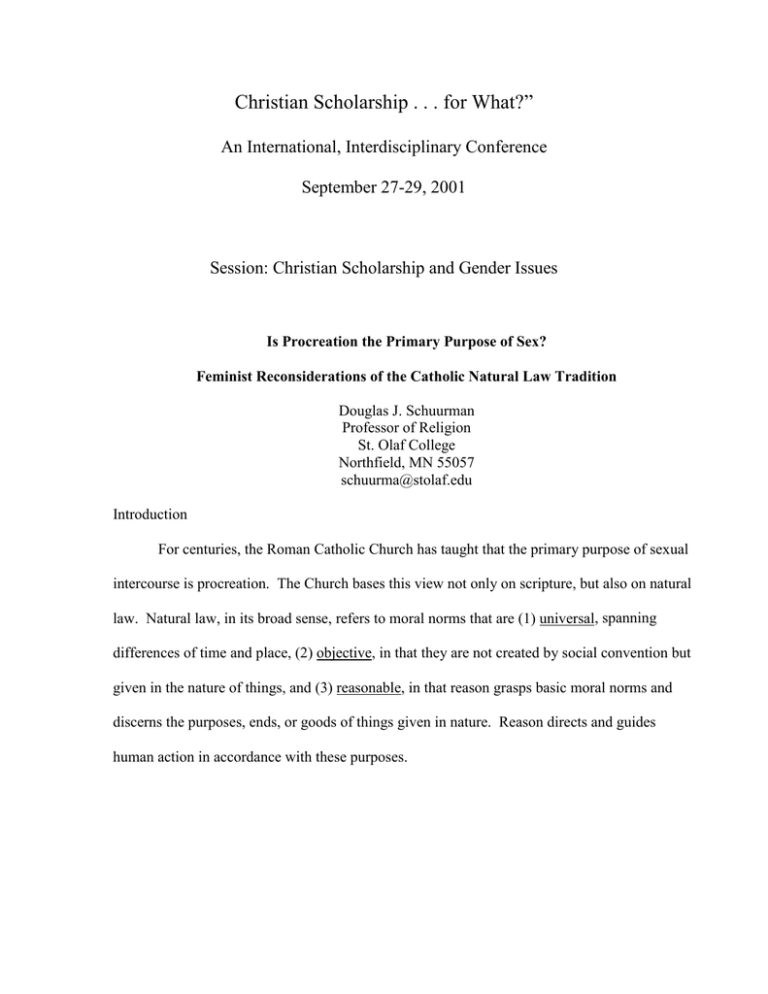
Christian Scholarship . . . for What?”
An International, Interdisciplinary Conference
September 27-29, 2001
Session: Christian Scholarship and Gender Issues
Is Procreation the Primary Purpose of Sex?
Feminist Reconsiderations of the Catholic Natural Law Tradition
Douglas J. Schuurman
Professor of Religion
St. Olaf College
Northfield, MN 55057
schuurma@stolaf.edu
Introduction
For centuries, the Roman Catholic Church has taught that the primary purpose of sexual
intercourse is procreation. The Church bases this view not only on scripture, but also on natural
law. Natural law, in its broad sense, refers to moral norms that are (1) universal, spanning
differences of time and place, (2) objective, in that they are not created by social convention but
given in the nature of things, and (3) reasonable, in that reason grasps basic moral norms and
discerns the purposes, ends, or goods of things given in nature. Reason directs and guides
human action in accordance with these purposes.
In the Catholic tradition natural law “is associated above all with a particular
sexual ethic.”1[1] It seems “natural” and “reasonable” that procreation is the primary
“end” or “purpose” sexual intercourse. Natural law also teaches, or at least reinforces,
the claim that sex belongs properly only in life-long, monogamous, heterosexual
marriage: heterosexual, because same-sex coitus cannot be procreative; monogamous,
because knowing that this child is “my” child ensures the likelihood that parents will care
for that child; and life-long, because the mutual needs and obligations parents and
children have for each other extend over a life-time. Reason and nature thus confirm
what is taught about sex and marriage in Christian scripture.
This natural law ethic is the basis for the Catholic Church’s condemnation of many
sexual practices as immoral because they are “unnatural.” Same-sex coitus and masturbation are
immoral because they cannot be procreative; sex outside of marriage is immoral (pre-marital sex,
post-marital sex, recreational sex) because it severs sex both from the intention to bear and
nurture children, and from the life-long mutual commitment that is necessary for those tasks;
intentional contraceptive interference with procreation is unnatural in its severance of sex and
procreation and so is immoral.
Today the doctrine of natural law has fallen on hard times. Pluralism easily slides into
ethical relativism or ethical nihilism, which denies that there are objective and universal moral
norms. A post-modern hermeneutics of suspicion rejects the whole idea of an unbiased,
universal reason. Reason, rather, is a masquerade cleverly manipulated by those who are in
1[1]
Jean Porter, Natural and Divine Law: Reclaiming the Tradition for Christian Ethics (Grand Rapids:
Eerdmans Publishing Company, 1999), 188.
social and cultural power to reinforce their power. As free, autonomous individuals modern
people define their own morality as they see fit; to do otherwise is to remain in childlike fashion
under the norms of some external authority.
If natural law has fallen on hard times, then the Catholic sexual ethics has hit the great
depression. In our sex-saturated, individualistic culture, sex is good if it feels good. If two
consenting adults agree to it and no obvious harm is done by it, sex is fine. People view the
Catholic condemnation of artificial contraception, for example, with puzzlement. At best it is a
quaint remnant of an ancient, irrelevant era; at worst it is a mechanism reinforcing the
subjugation of women and over-population in an unsustainable world. In either case its
prescriptions are widely ignored, inside and outside the Catholic Church. The culture’s ethic of
freedom in sex has permeated Christian practice in modern times, so that such practices as premarital sex, same-sex sex, masturbation are permitted, and even celebrated. New reproductive
technologies enable single people, as well as gay and lesbian couples to have a biological link to
their children. The only aspect of natural law that remains operative is the moral norm of nonmaleficence (“Do no harm”).
Feminist Christians respond these developments in a variety of ways. Some embrace the
demise of natural law, seeing gender relations as socially constructed and malleable, and
celebrating freedom from compulsory heterosexuality and its constrictions. Others warn that
moral relativism, accusing all existing values of being conventions maintained by the powerful,
will boomerang back on feminists when they try to bring about greater justice for women around
the world.
My focus today is upon two Roman Catholic theologians who are re-examining marriage
and family in light of the tradition of Natural Law. The two are Lisa Sowle Cahill, who teaches
at Boston College, and Jean Porter, who teaches at University of Notre Dame. Cahill’s
publications have focused on feminism and gender issues more so than Porter’s has. Both have
deep commitments to the Roman Catholic Church and to equality and mutuality between women
and men. They have made substantial contributions to Christian gender ethics, as well as to
other areas of theological ethics. They want to retrieve central aspects of the Catholic Natural
Law tradition, while avoiding its pitfalls. And they want to make procreation central to an ethic
of sex and marriage. I will begin by tracing their view of natural law. Then I will examine their
natural law based view of sex and marriage. I will conclude with some reflections on what
Christian scholars from Protestant traditions might learn from, and contribute to, these Catholic,
feminist insights.
I. Revised understanding of Catholic Natural Law
The retrieval of the Catholic Natural law doctrine by Cahill and Porter centers on two
claims: (1) Modern critics and defenders of Natural Law alike have a mistaken notion of the
Natural Law doctrine. (2) Central claims of the Natural Law tradition are intellectually
defensible and practically needful for contemporary life.
A. Salvaging Natural Law from mistaken ideas of its meaning
1. Correcting the misunderstanding
Jean Porter aims to correct what she argues are mistaken understandings of Medieval
Natural Law held by modern critics and defenders of the doctrine. She focuses most of her case
on two misunderstandings: (1) the principles of natural law a-historical in two ways. (a) First,
they are based on a form of reason that is detached from Christian practice and doctrine. (b)
Second, they are fixed and static, and unchanging through history and cultures. (2) Natural law
is conservative and conformist, functioning to reinforce the status quo. These misunderstanding,
Porter argues, have roots in the Enlightenment, and have become pervasive in the Twentieth
Century.
To correct these misunderstandings, Porter shows that Medieval Catholic thinkers
understand the moral norms of Natural Law (1) deeply embedded in Christian beliefs and
practices rather than detached from them. They are grounded especially in Christian convictions
regarding the world as creation and human beings as in the image of the Creator, and they are
reflected in the moral teachings of God’s law revealed in the Bible. Medievals believed that the
basic moral principles revealed in the Bible were “reasonable” in the sense of being a
generalizable body of teachings that had rational grounds more widely available than some other
of its teachings (e.g. Ceremonial Precepts, the Trinity or Incarnation). Though Enlightenment
thinkers may have detached Natural Law from its moorings in Christian theology and practice,
claiming to derive them from pure reason alone, many Medieval thinkers certainly did not.
Porter also shows (2) that the Natural Law was not static and fixed, but historically
dynamic and changeable. Medievalists were not naïve essentialists. The held that here are some
core norms, embedded in human nature, that are more stable and lasting then others. But their
applications can vary widely depending upon time and circumstance. The first principles of
Natural Law, according to Aquinas, are that one ought to seek good and avoid evil, and the
Golden Rule (Do unto others as you would them do to you). But how these are applied differ
depending on time and circumstance. As a medical doctor’s prescriptions vary from patient to
patient, but serve the good of health, so too specific moral prescriptions may vary, but still serve
fundamental moral goods. Pervasive natural inclinations--to self-preservation, to sexual union
with the opposite sex, to care for offspring--indicate basic human goods, giving rise to norms
whose applications vary. For example, the inclination to self-preservation indicates the good of
life itself, giving rise to the norm that one should care for one’s own life and avoid that which
destroys it. Yet there are times when one rightly sacrifices one’s well-being and even one’s life,
as in cases of Martyrdom.
Porter also challenges (3) the widespread view that Natural Law functions as a
conservative force to preserve the status quo. She argues that because the Medievals
distinguished Natural Law from convention, Natural Law in fact contributed to progressive
changes in social life. It did so by providing a framework for social analysis, enabling them to
examine existing institutions in terms of whether they were based upon mere convention or upon
deeper principles of natural law.2[2] In addition to supplying the basic framework for moral
analysis and critique, natural law proposed many substantive purposes and goods that shaped this
2[2]
Porter, Natural and Divine Law, 77-79. Porter notes, for example, that the Summa reginensis “sets forth
an explanation of the way in which the laws of inheritance can be understood as originating from the
evensuality we share with other animals” (78).
analysis. Aquinas, for example, held that unlike angels (who by nature are hierarchical) humans
are by nature equal. Accordingly he thought that social hierarchy was unnatural (though he
justified it for other reasons). He also held that by nature all goods were common, qualifying his
rationale for private property in important ways. Porter argues that the over-all direction of
Medieval Natural Law supplies a rationale for new and developing forms of social life, not to
reinforce existing ones. Its basic tendencies are toward social equality and justice, even if
Medieval thinkers devised ways to justify inequality.
Porter sums up her view of Medieval Natural law thinkers, noting that they “did not
attempt to derive moral principles from a supposedly self-evident and fixed conception of human
nature.” Rather they built on the theological concept of the natural world developed by their
predecessors, combined with texts from Genesis and the Pauline letters,
They developed a theological conception of human nature that enabled them to
distinguish between those aspects of our nature that are normative and those that are
not.... [N]atural law in its primary sense was identified either with reason or with the
most basic natural principles of action, which were in turn linked to the image of God,
that is, the capacity for moral judgment found in all men and women. So understood, the
natural law was distinct from specific customs, practices, and laws, which could thus be
evaluated by the criterion of their (necessarily imperfect) approximation to the ideals of
natural equality and respect for
the goodness of creation.3[3]
2. Presenting a case for Natural Law today
Porter tries to show that Natural Law claims are plausible by reconstructing central parts
of Medieval Natural Law thinking and bringing them into dialog with contemporary debates
about marriage and sexual ethics, and social ethics. Her hope is that the reasonableness of these
views and their applications will convince others of their truth and viability. Cahill agrees with
3[3]
Porter, Natural and Divine Law, 17.
Porter, praising her book in a blurb on its back cover.4[4] In her book, Sex, Gender, and Christian
Ethics, Cahill is mainly concerned with a contemporary Christian ethics of sex and gender. She
is less concerned with Medieval views of Natural Law than with Natural Law claims in relation
to contemporary feminist and sexual ethics. As a theologian committed both to her Roman
Catholic tradition and to feminist goals, she forges a mutually critical synthesis of feminist and
Catholic sexual ethics. After identifying a few of her concerns, I will trace her approach to
Natural Law and her argument for its viability and necessity.
From the side of feminism, Cahill affirms her “commitment to equal personal respect and
equal social power for women and men.”5[5] But she strongly opposes feminists who follow
postmodern relativism (especially that of Michelle Foucault), which sees gender as socially
constructed “all the way down,” and which condemns traditional Christian sexual ethics as
arbitrary and oppressive. From the side of traditional Christian teaching, she affirms a version of
Natural Law, but acknowledges that it has often been distorted and abused to support
subordination and oppression of women. Affirming Natural Law, Cahill constructs a sexual
ethics that upholds goods of long-term commitment and procreation as central to sexual
intimacy. Before focusing on her sexual ethics, I will summarize her view of Natural Law.
a. Cahill’s view of Natural Law
4[4]
Cahill says, “This is a first-class contribution to fundamental ethics. It is elegantly written, historically
sensitive, philosophically sophisticated, and theologically nuanced. Jean Porter replies brilliantly to
theological varieties of naïve essentialism and postmodern relativism as she illumines an alliance between
natural law theory and Christian faith that is at once traditional and contemporary.” From the back cover of
Porter, Natural and Divine Law.
5[5]
Cahill, Sex, Gender, and Christian Ethics, 1.
Cahill identifies her own Natural Law approach as “critical realism.” Drawing on the
Aristotelian-Thomistic tradition, she argues that “it is possible to establish shared moral values,
at least at the fundamental and general level.” She rejects Kantian approaches, which set the
foundations of morality in innate structures of rationality or consciousness that are self-evident to
practical reason. Instead the foundations are found “as broad areas of agreement about human
needs, goods, and fulfillments which can be reached inductively and dialogically through
humanftnref6" title="">1[6] Attentive to the diversity of cultural expressions, Cahill aims at
reinvigorating reason and its role for morality in a “historically conscious era.”6[7] With Porter,
then, Cahill affirms the fundamental tenets of Catholic Natural Law and affirming them in a way
that avoids the misconceptions traced above.
b. Criticism of postmodern relativism
Cahill’s argument for critical realism and against postmodern relativism focuses on two
points. The first the weakness or inconsistency of relativism at the practical level. She says,
“most postmodern thinkers count on a consensus about liberal values which they do not
theoretically defend. They work out their practical programs in a context of cultural
commitment to liberal equality.”7[8] For postmodern feminists this is evident in their advocacy of
women’s equality and rights, on the one hand, and unqualified celebration of “otherness,” on the
other. If part of the otherness is a value structure that justifies the dominance of men over
women and violation of basic human rights of women, as is often the case, then how can one
consistently celebrate it and advocate equality?
6[7]
7[8]
Cahill, Sex, Gender, and Christian Ethics, 235.
Cahill, Sex, Gender, and Christian Ethics, 29.
The second point is implied by the first. It is that cross-cultural resistance to oppression
and injustice “will be disabled if the equality of women, or even equality as a critical social
principle in general, is not firmly enough implanted culturally and politically to survive its
philosophical discreditation.”8[9] She cites a story told by Martha Nussbaum to support her
claim. Nussbaum, a philosophy professor at the University of Chicago with long-standing
experience working for economic development in India, was at a United Nations conference in
Helsinki. At the conference, an “’elegant French anthropologist’” defended restricting the
movement of menstruating women in India “as intrinsic to the ‘embedded way of life’ in rural
villages, where sexual and reproductive roles determine public and workplace proprieties.” She
also “bemoaned the decline of the cult of the Hindu goddess Sittala Devi, whose protection
against smallpox is no longer as necessary in India as it was in the past.” When someone
objected that gain in human life “surely outweighs threatened reduction of cultural variety, the
anthropologist rejoined with a rebuke to ‘Western essentialist medicine’ and its ‘binary
oppositions,’ and called upon ‘radical otherness’ to put down any contrast between the value of
life and the evil of death.” Nussbaum replied that the difference between life and death was “’of
the most binary kind imaginable.’”9[10]
Cahill notes that this story shows how “self-congratulatory relativism functions both as a
tool of one-up-(wo)manship in the academy and as a front for disregard of the plight of less
privileged human beings.”10[11] She also observes that the “rhetoric of incommensurable
worldviews” is much more prominent in the theories of First World feminists than in those of
8[9]
Cahill, Sex, Gender, and Christian Ethics, 29.
Cahill, Sex, Gender, and Christian Ethics, 30-31.
10[11]
Cahill, Sex, Gender, and Christian Ethics, 30.
9[10]
Third World women scholars and activists. Citing calls for equality and human rights by
international gatherings of Third World women, a UN conference on Human Rights held in
Vienna, and popular media depictions of the plight of women in India, Cahill concludes that “at
the level of experientially recognized and practically important needs, social ethics proceeds on
the assumption of a shared humanity and at least a fundamentally shared moral vision, whether
or not the philosophical warrants for that assumption are clearly in place. Without some
essential unity of human moral experience and common recognition of values, virtues, and vices,
social criticism in the name of justice would be impossible.”11[12] Natural Law thinking provides
foundations that are essential to the fight against cruelty.12[13]
c. Case for Natural Law
In addition to showing the deficiency of relativism and the practical need for
realism/Natural Law, Cahill illustrates the viability of her Natural Law approach. She does so by
developing the defense of moral objectivity and universality proposed by Martha Nussbaum.
Cahill’s aim is to point a way “to a contemporary, feminist, Christian, intercultural ethics of sex
and gender which is historical and inductive, revisable by nonrelativist."13[14] This approach
begins by identifying common human experiences. The revisable list includes mortality,
embodiment, capacity for pleasure and pain, cognitive capability, life-cycle developments.
Positive functioning within these areas capacities is valued cross-culturally and is the ground of
morality. This gives rise to goods, and to a concept of human excellence. Virtuous action
11[12]
Cahill, Sex, Gender, and Christian Ethics, 33.
Cahill, Sex, Gender, and Christian Ethics, 31.
13[14]
Cahill, Sex, Gender, and Christian Ethics, 55.
12[13]
promotes this excellence, and vicious action detracts from it. There may be great variety in
cultural and institutional expression, but the core is common.
For example, consider the life-cycle experience of moving from childhood into
adulthood. Successfully entering into the privileges and responsibilities of adulthood is a good
that is universally valued. Virtues are those dispositions that enable a person to make that
transition successfully as one part of human excellence. Though all this is common, the variety
of cultural and social meanings and institutions surrounding this passage is extensive. Reason
apprehends goods and virtues as it reflects on human experience and is in dialog with others.
The approach is inductive, not deductive; the universal is only found in and through the
particular. Cahill intends her book to be an example of such a dialogical, inductive expression
leading to recognition of the truth of her basic moral claims.
II. Sex and Procreation
A central theme in Catholic sexual ethics is that procreation is the primary purpose of
sexual intercourse. Cahill and Porter affirm one version of this theme. They acknowledge that
elements in the Christian tradition “denigrated the body, condemned sexual desire, urged sexual
abstinence, and tolerated sexual activity only in view of its procreative intentions.”14[15] And
they admit that the sexual ethics of Christian tradition has contributed to the domination of
women and oppression of gays. But they disagree with those who respond to these distortions by
endorsing only the norm of “fulfillment of one’s own sexuality (sexual desire and pleasure)
14[15]
Cahill, Sex, Gender, and Christian Ethics, 5.
through freely chosen and affectively intimate relationships with other adults.”15[16] Even many
Christian ethicists seem to share the view that pleasure and self-fulfillment, rather than
procreation, is the primary purpose of sex. Christine Gudorf, for example, says we should reject
the “’assumption that sex is naturally oriented toward creation of human life.’” Instead, she says,
“’the general direction in which humanity needs to move is toward more pleasurable, spiritually
fulfilling, frequent sex, coupled with a reduction in world population.’”16[17] Cahill and Porter
oppose this separation of sex from procreation, and of sexual ethics from natural law. Sex
should be fulfilling, pleasurable, equitable, and intimate. But it should not be all these at the
expense of procreation and life-long commitment.
Though, with Rome, Cahill and Porter affirm Natural Law and resist the modern
tendency to see sex as normed only by pleasure and mutual consent, against Rome, they want to
increase women’s (and men’s) sexual freedom, equality, and self-determination. Specifically
they want to establish the moral right, and even duty, to use some forms of birth control (neither
approves of abortion unless the life of the mother is at risk). They believe that women should be
able to have a life outside the home as well as within it, and that contraception is crucial to that
ability. Such equality is important to the “mutual love” that the Catholic tradition holds up as the
norm and goal of marriage and sex. They also want to expand the tolerance of the Christian
community toward sexual practices that deviate from the celebrated norm--gay and lesbian
relations, a-typical family structures, elderly people who live together but do not marry for
financial reasons, divorced people. Before I identify their own proposals, I should say more
about contemporary Catholic teaching about sex and marriage.
15[16]
Cahill, Sex, Gender, and Christian Ethics, 6. This is the recommendation of James B. Nelson,
Embodiment: An Approach to Sexuality and Christian Theology (Minneapolis: Augsburg, 1978), 126.
16[17]
Cahill, Sex, Gender, and Christian Ethics, 6.
A. Sex and Marriage in Contemporary R.C. teaching
Contemporary Catholic teaching clearly affirms the goodness of sex and procreation
within marriage. And it clearly situates marriage within the broader community, emphasizing
the vocation of the parents to birth and nurture children who will one day contribute to the
common good of the world. Here Cahill and Porter whole-heartedly agree. They disagree with
how these insights have been worked out in some parts of recent Catholic teaching.
According to moral teaching found in nearly all moral manuals used in Catholic
seminaries for the first half of the Twentieth century, “all intentional acts resulting in ‘venereal
pleasure” outside of marriage” are immoral. Until recently, Roman Catholic moral teaching
identified procreation as the primary purpose of sex within marriage.17[18] All sexual acts should
follow the structure necessary for procreation. Mutual help and avoidance of sexual sin were
legitimate, though secondary, purposes of sex and marriage. The only morally licit way to avoid
pregnancy was by refraining from procreative acts; “neither incomplete sexual acts (for example
withdrawal) nor artificial contraceptives” are allowed.18[19]
The 1930 encyclical, Casti connubii, speaks of marriage in terms of the mutual love of
the spouses, but continues to
17[18]
18[19]
For this summary I rely mainly upon Cahill, Sex, Gender, and Christian Ethics, 194-199.
Cahill, Sex, Gender, and Christian Ethics, 194.
identify procreation as the primary purpose of sex and marriage.19[20] Since Vatican II (Gaudium
et spes, 1965) and the 1968 encyclical, Humanae vitae, the language of primary and secondary
ends for sex and marriage has been “sidelined.”20[21] Humanae vitae identifies two seemingly
equal purposes of sex. It says that there is an
inseparable connection, willed by God and unable to be broken by man on his own
initiative, between the two meanings of the conjugal act: the unitive meaning and the
procreative meaning. Indeed, by its intimate structure, the conjugal act, while most
closely uniting husband and wife, capacitates them for the generation of lives, according
to laws inscribed in the very being of man and woman. By safeguarding both these
essential aspects, the unitive and the procreative, the conjugal act preserves in its fullness
the sense of true mutual love and its ordination towards man’s most high calling to
parenthood. We believe that the men of our day are particularly capable of seizing the
deeply reasonable and human character of this fundamental principle (par. 16).
The emphasis here falls upon the inseparable connection between two purposes, not their ranking
as primary or secondary. The main concern behind much of the moral teaching about sex is
artificial contraception and its adverse impact on sex inside and outside of marriage, though
traditional prohibitions (e.g. masturbation, same-sex coitus, extra-marital sex) are reaffirmed.
19[20]
Encyclicals are official Roman Catholic church teachings, written by the Pope in consultation with the
Congregation of Sacred Doctrine (a small army of theologians responsible for the doctrine of the church),
and intended to apply throughout the world (as opposed to only some region of it) as guidance for bishops,
priests, members of religious orders, Roman Catholics, and all people of good will. Some, such as Veritatis
Splendor, are addressed only to the bishops. Others, such as Centesimus Annus, are addressed to the
bishops, priests and deacons, members of religious orders, and all men and women of good will.
Encyclicals aim to apply the infallible teachings of scripture and historic solemn assemblies of the church
(e.g. Nicene Creed), to pressing questions and concerns in a given era. Though technically they do not
have the same authority of the “infallible” teachings (except for where these are repeated within an
encyclical), their authority is assumed as superior--in matters of doctrine--to private judgments of
individual Christians and clergy, and groups of clergy.
20[21]
Cahill, Sex, Gender, and Christian Ethics, 196.
In the 1980’s Pope John Paul II “built an entire theology of sex and marriage around the
concept that sex in marriage is first and foremost a total self-gift of spouses.”21[22] In the
encyclical Donum vitae Pope John Paul II says,
In reality, the origin of a human person is the result of an act of giving. The one
conceived must be the fruit of his parent’s love. He cannot be desired or conceived as the
product of an intervention of medical or biological technique; that would be equivalent to
reducing him to an object of scientific technology (sec. 4).
A central concern behind the Pope’s emphasis upon sex as an act of total, mutual self-gift is
reproductive technology. Anything that violates the integrity of sex as self-gift is immoral. In
Vitro fertilization, surrogate motherhood, insemination by a donor (egg or sperm), are thus all
immoral. Methods that might help infertile married heterosexual couples, single persons and gay
or lesbian persons wanting a biological connection with her or his child are judged immoral. In
Pope John Paul II’s teaching the procreative purpose of sex remains, but the emphasis now falls
strongly on mutuality, specifically the “mutual self-gift” of one spouse to the other in having sex.
Though for centuries the Catholic church has taught that wives should be subordinate to
their husbands, its official position now is that wives and husbands are equal and mutually
subject to each other. In 1988 encyclical, On the Dignity and Vocation of Woman, Pope John
Paul II interprets of Ephesians 5:21ff. as teaching not a one-sided subjection of wife to husband,
but “mutual subjection” of wife and husband to each other. He specifically relates this mutuality
to the gospel’s innovative impact on gender relations in a Christian marriage (par. 24).
B. Cahill/Porter’s proposals
21[22]
Cahill, Sex, Gender, and Christian Ethics, 196.
Cahill and Porter both share the Magisterium’s affirmation of the theological value of
procreation as essential to God’s good creation, its linking of procreation with sex, its grounding
of sexual ethics in Natural Law (though they less confident that all reasonable people will
immediately see its truth), and the recent emphasis on mutuality in marriage.
Cahill’s proposal begins by grounding marriage and family in biology. She says human
sexual differentiation and sexual reproduction “stand as experiences which begin in humanity’s
primal bodily existence, and which all cultures institutionalize (differently) as gender, marriage,
and family.”22[23] She then establishes moral norms for these institutions.
Human flourishing, as sexually embodied, depends on the realization of the equality of
the sexes...; and in their sexual union on the further values of reproduction, pleasure, and
intimacy.23[24]
The personal meaning of embodied men and women is enhanced “when physical intimacy
expresses affection, mutual vulnerability, commitment, and understanding.” This gives rise to
marriage covenants that clarify responsibilities and stabilize the personal union over time. There
are innate connections between reproduction, pleasure, and intimacy such that to divide them, or
truncate one or more of them, will lead to deficient “moral behavior or inadequate moral
analysis.”24[25] Sex that takes place in a context of domination, or which leaves out either
intimacy, pleasure, or reproduction is then deficient, or immoral. To make procreation primary
while denigrating pleasure, as some Augustian traditions do, is deficient. To have sex always
and only for pleasure and intimacy, intentionally excluding all possibility of children, as many
22[23]
Cahill, Sex, Gender, and Christian Ethics, 110.
Cahill, Sex, Gender, and Christian Ethics, 110.
24[25]
Cahill, Sex, Gender, and Christian Ethics, 112.
23[24]
moderns do, is likewise deficient. When all three “bodily dimensions of sex” are developed over
time through the bodily, personal, and social levels, then human sexual experience is complete.
Cahill thus recovers and affirms all the core elements of contemporary Catholic sexual ethics.
Though procreation is not the primary purpose of sex, it is one essential purpose.
Cahill also criticizes official Catholic teaching about sex and marriage. She criticizes its
proscription of contraception. Contraception is necessary for women’s sexual freedom equality,
a core concern for Cahill and Porter. (1) They argue that it breaks marriage, and sex, down to a
series of disconnected sexual acts. Though, as Porter says, “there is something problematic,
from the Christian standpoint, in the deliberate choice to remain childless throughout a
marriage,” this does not mean that all contraception and avoidance of pregnancy should be
forbidden as immoral.25[26] It is not every act of sex that is the focus, but rather the marriage as a
whole, and extended through its lifetime. This allows for use of contraception and responsible
family planning.
Cahill also argues (2) that the Catholic position that every act of sex must combine the
unitive purpose and the procreative purpose in an act of total self-giving is an ideal that cannot
and will not be consistently experienced. In her terms, not every act of intercourse will express
intimacy, pleasure, and reproduction in a context of equality. This remains ideal. But a more
honest and realistic approach would permit some use of contraception. The Church should
uphold and celebrate procreation in sex and marriage as part of its ideal, but it should recognize
that many practical considerations--health, economic capacities, concern for over-population-may cause some couples not to have children. Porter says the Christian community “should
25[26]
Porter, Natural and Divine Law, 225-227. Cahill, Sex, Gender, and Christian Ethics, 112-113.
encourage couples [who are infertile or who choose not to have children] to express the value of
procreation in other ways, either through adoption or the care of foster children or else through
committing themselves as a couple to serving the life of the wider society.”26[27]
Porter and Cahill want more tolerance for those who deviate from some elements of the
ideal. We should neither regard as “morally pernicious” nor withhold social approval and
support from those who fall short of the ideal. Cahill does not want “a norm which excludes all
it does not idealize.” She says,
My intent is not to use an ideal of committed, parental sex to condemn, exclude, or cast
into the shadows “nonconformists,” such as gay and lesbian persons, divorced persons,
persons desirous of a committed relationship who enter tentative sexual liaisons hoping
for eventual love and permanency, or those who settle for a probably temporary
relationship because it makes available something of the intimacy and sexual fulfillment
for which they long.27[28]
The fundamental NT concern is not to define moral and immoral forms of sexual conduct, but
rather to transform “all human relations toward greater equality, compassion, and
solidarity.”28[29] The moral advice she gives to gay people likely applies to others who deviate
from the ideal. Their sexual drives “should be channeled by the moral values which humanize
heterosexual relationships, that is respect, reciprocity, love, and commitment.”29[30]
Summing up, Cahill and Porter affirm a revised Natural Law theory, which holds that
there are universal moral norms that should govern sex and marriage. These are discerned
through thoughtful, dialogical discussion grounded in a variety of traditions and expressed in
26[27]
Porter, Natural and Divine Law, 227. See also
Cahill, Sex, Gender, and Christian Ethics, 116.
28[29]
Cahill, Sex, Gender, and Christian Ethics, 117.
29[30]
Cahill, Sex, Gender, and Christian Ethics, 101. See also Porter, Natural and Divine Law, 227-233.
27[28]
contemporary debates. They should govern diverse individual and institutional practices
structuring sexual activity, marriage, and family. Sex, marriage, and family are goods. In a
context of equality, sex and marriage as a whole ought to express human flourishing by striving
toward intimacy, pleasure, and reproduction. In this way, sex, marriage, and family serve greater
goods in the broader human community. This ideal ought not be misused to condemn morally or
otherwise harm those who deviate from it, as has been the case with much of Catholic teaching,
particularly on contraception, nom-marital sex, and same-sex sex. Some deviations--such as
rape, adulterous sex, promiscuous sex, and exploitive, manipulative sex--deviate in ways that
should not be tolerated.30[31] Those who deviate will experience more of human flourishing the
more they approximate the ideal.
III. Assessment of revised Natural Law and sexual ethic
There are far too many complex issues for me to even attempt a thorough evaluation of
the proposals and arguments of Porter and Cahill. My aim has been to introduce these two
important feminist, Catholic theologians to many Protestant thinkers who may not know much
about them or their views of natural law, sex, marriage, and family. In the spirit of that aim, my
assessment will focus on a few points for comparison and for further reflection.
A. Of revised Natural Law doctrine
Many Protestants have been critical of Natural Law for theological reasons.
Annabaptists, and other radical reformers, object that is provides extra-Biblical source of moral
30[31]
So far as I’ve been able to determine, neither Cahill nor Porter clarifies which deviations should be
tolerated and the basis of that distinction. My summary is an attempt to express the implications of their
positions.
norms, contrary to the non-violent teaching of Jesus, used to justify Christian participation in war
and coercive legal institutions. Others criticize it for failing to account for the radical disruption
of sin, which both distorts reason’s ability to discern norms in nature and alters the human
condition in ways that make those norms and their implications irrelevant. Karl Barth, likely the
most vigorous critic of Natural Law, says it shifts the center of Christian faith away from Jesus
Christ by providing an alternative source of moral and religious norms.
Taken together Cahill and Porter provide a compelling example of and case for Natural
Law. They show that Natural Law thinking does not support conservative conformism to the
status quo, but tends toward transformation. By correcting misunderstandings and presenting a
view of basic moral norms as deeply grounded in Christian theology and scripture, discernable
through thoughtful dialog, they provide a bulwark against postmodern relativism. Cahill is right
about the logical and practical inconsistencies of ethical relativism. They also illustrate the truth
that nature has morally significant implications for moral norms and ethical analysis, without
falling into a simplistic biologism. The complex connections they see between what is given in
nature and normative reflection is just what I think is needed.
Though there is debate about Calvin’s view, I think the stronger case about Calvin is that
he affirms natural law. Dutch Calvinism’s traditional emphasis upon Creation, and faith’s power
to redeem fallen reason so that it can discern Creational norms for human life, has strong
affinities with Roman Catholic Natural Law thinking. This affinity invites more extensive
comparisons between the two traditions on these matters.
B. Sexual Ethics
1. Where all agree
I agree with Porter and Cahill where they agree with contemporary Roman Catholic
thinking. Their deep concern to correct modern sexual practices and attitudes is well founded.
Sex, marriage, and family should be valued and celebrated as good, expressions of the goodness
of the Creator. Wives and husbands are to be mutually subject to each other out of reverence for
Christ. Sexual intercourse ought to take place in the context of a life-long, heterosexual,
exclusive commitment we call marriage, and ought to unite, over the course of time, intimacy,
pleasure, and reproduction. Sex, marriage and family ought to serve larger goods that contribute
to the broader society. The Christian community should uphold and celebrate this ideal, while
being supportive of those who deviate from that ideal.
2. Where Porter and Cahill depart from contemporary Catholic teaching.
Their affirmation of the moral legitimacy of contraception is on target, both as important
for women’s equality and as based on a faulty notion that each act of coitus must be in principle
open to procreation. I wish they had been clearer and more specific about which forms are
legitimate given their sexual ethics. It is unclear, for example, whether they agree with Rome’s
belief that a fertilized egg deserves moral standing as human life. I do question their claim that
deliberately childless marriages are morally problematic.31[32] They do make room for
exceptions, and try to minimize moral fault by using language of falling short of an ideal, rather
31[32]
Porter, Natural and Divine Law, 225.
than breaking a commandment. But one should ask whether the other factors would legitimately
lead a couple to remain childless. Some couples might legitimately choose not to have children,
or to have fewer of them, in order not to contribute to over-population. Some forms of service to
God’s kingdom might be more effective if a couple were childless. If Paul’s hope for the Return
of Christ could cause him to recommend the single life over the married life, could it not also
cause a Christian couple to forego having children? Behind this is the more general question of
how the coming kingdom of God relates to the original creation benediction to “be fruitful and
multiply.” Not having children simply to enjoy more freedom, travel, and discretionary income
is morally problematic. But the other reasons seem to me to be acceptable, if not laudable.
Their treatment of homosexuality and other forms of extra-marital sex (in Cahill’s
discussion) are somewhat confusing. On the one hand, same-sex coitus and extra-marital sex fall
short of the moral ideal for sex and marriage. On the other hand, they do not want those who
participate in such practices to feel they are subject to ethical critique. I don’t know that they can
have this both ways. The Catholic tradition has a remarkable ability to make exceptions,
distinguish gradations of moral and religious fault, and finally include many who deviate from its
own teachings. In some respects, their position would support a view presented by Lewis
Smedes in a 1998 article (I think in Perspectives). He suggests that Christians should approach
gays and lesbians the way they approach infertile couples who adopt children. Same-sex
orientation, like barrenness, is not “natural.” But the broader Christian community should not
stigmatize alternatives--adopting children and establishing same-sex unions--. The issue of how
to respond to those who depart from the ideal, especially in the case of gays and lesbians, is
difficult. And Cahill and Porter are to be commended for including them in their discussion.
Cahill and Porter also should be clearer about whether the tolerance they promote should
extend to all deviations from the ideal or only to some. Cahill and Porter do not show the same
moral tolerance for those who use sex as a tool of domination as they show to gays or to people
having non-marital sex in relatively committed relationships. They do not want tolerance for
rape, adultery, prostitution, or unlimited promiscuity. They want those who engage in such
practices to feel a moral critique in a way that ought not apply, for example, to gay people living
in a monogamous, life-long relationship. Implicit in their writings is a distinction between
deviant practices that ought to be tolerated as “deficient,” and those practices that ought to be
criticized as deficient and deeply immoral. It would help if that distinction were made explicit.
Their reflection on reproductive technologies rightly warns, with the Pope, against
reducing the mystery and personal character of life to technological powers. Their (especially
Cahill’s) openness to these technologies as possible avenues of compassion and help is
commendable. It seems to me that they are right that papal teaching that children must be the
result of a personal act of total self-gift, though ideal, is often impractical. Parental love may
very well be expressed by making use of at least some of methods available. Because Protestant
sexual ethics in the Twentieth century has usually rejected the view that it is immoral to interfere
intentionally with the procreative potential of sex, it has been more open to using contraceptive
strategies. This also leads some of the more Liberal Protestant groups to justify sex between
gays and lesbians who live in a monogamous, life-long committed relationship. Once
procreation is severed from intimacy and pleasure, similar standards can be followed by heteroas by homosexual partners.
Porter and Cahill wisely agree with the deep concerns behind Catholic sexual ethics. The
integrity of human sexual life is deeply threatened by contraception and reproductive
technologies. There are, and ought to be, limits to what human freedom and technology are able
to do. These limits have deep roots in our biological, created natures, and are reflected in
scriptural teachings about sex and marriage. In respecting these core concerns and beliefs, and in
revising other teachings in ways deeply supportive of feminist concerns for mutuality and
equality, Cahill and Porter have successfully forged a creative synthesis of their own Catholic
and feminist identities.
3. Policy implications
A question Cahill and Porter only touch upon needs further development. That is what
legal and policy implications follow from or cohere with their ethics of sex, marriage, and
family. Should the Christian community promote this ethic for themselves only, or should they
promote it in the broader non-Christian society? Porter raises the question, and then says the
Church should promote it among themselves. Cahill’s larger argument about Natural Law
suggests that much of her ethic, based as it is upon common human experiences, needs, and
goods, should be advanced for the larger society as well.
What institutional means should be used to promote it, whether inside or outside the
church? For example, their view that same-sex sex is deficient might suggest that the Christian
community should not celebrate or approve of it with publicly recognized and celebrated
covenants because that might detract from the force and clarity of the ideal. However, Cahill
also says that the more closely a deviant pattern of sex approximates the ideal, the more fulfilling
it will be. In light of this, Christian compassion might suggest that the Church ought to approve
of gay marriage covenants as compassionate ways to help gays and lesbians approximate the
ideal.
Should Christians impose their ethic of sex, marriage, and family on the larger society?
Should they try to influence public policies so as to privilege heterosexual marriage? In March
of 1994, a group of well-known Christian and Jewish ethicists signed and published a statement
“directed chiefly to debates over public policy and what should be socially normative.” They
“share the uneasiness of most Americans with proposals advanced by the gay and lesbian
movement” and try to articulate the reasons behind this uneasiness. They try to reverse the
cultural and policy shift, so that it is no longer as conducive to gay and lesbian life-styles.32[33]
My guess is that Porter and Cahill would oppose efforts like this one. But this gives rise to the
question of how their ideal should be promoted in the broader society. If a Christian ethic of sex,
marriage, and family is specifically Christian in ways not available to other members of society
who are not Christians, then Christians will be less likely (and less successful) to promote in the
larger society. But even within the Christian community questions remain. Should, for example,
the textbooks and literature of Catholic elementary schools express acceptance of gay and
lesbian life-styles? I think one could use the position of Cahill and Porter to support either
answer to the question. Their view that this ethic is based on a broad consensus, available to
32[33]
“The Homosexual Movement: A Response by the Ramsey Colloquium,” in First Things (March 1994,
#41), 15-20. Signers include Fr. Richard John Neuhaus (Institute on Religion and Public Life), Max
Stackhouse (Princeton Theological Seminary), Rabbi David Novak (University of Toronto), and Gilbert
Meilaender (Valparaiso University).
reasonable human beings as they reflect on sex, gender, marriage, and family could very well
supply a basis for promoting their view of these matters through laws and policies. It would be
helpful to hear more from them about these questions. I raise them not as criticisms. These are
extremely complex matters, and the focus of their books are on historical foundations of, and
contemporary reflection upon, natural law and its implications for sex, marriage, and family. We
are in their debt for writing about these foundations in ways that give rise to a rich and vital set
of further questions for Christian life and thought.
Conclusion
I raise these issues to spark further discussion of the important claims Cahill and Porter
have made, not to detract from their valuable work. The time is surely ripe to recover anew
something like Natural Law thinking and the core elements of a Christian view of sex, marriage,
and family. We need to discuss such matters as Christian scholars, and Porter and Cahill have
done us all a great service in leading the way with their serious, feminist, Christian scholarship.



